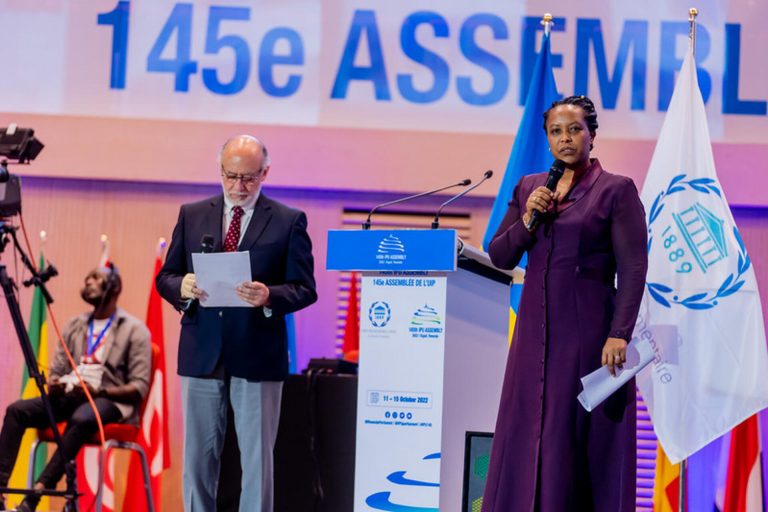
Parliamentarians from around the world have adopted the Kigali Declaration Gender equality and gender-sensitive parliaments as drivers of change for a more resilient and peaceful world at the end of the 145th IPU Assembly in Kigali, Rwanda.
The Declaration represents a milestone in progress towards gender equality and gender-sensitive parliaments. It encourages IPU Members to step up their efforts to promote gender equality in institutions and society.
The Declaration recommends that parliaments implement electoral gender quotas to achieve parity in political decision-making; ensure law-making and budgeting is gender responsive; place vulnerable populations at the centre of parliamentary action; and end gender-based discrimination and violence.
The Declaration also marks the 10-year anniversary of the IPU’s Plan of Action for Gender-sensitive parliaments.
IPU Member Parliaments committed to taking 10 actions in the next 10 years including measures such as adopting formal rules to establish gender-balance in parliamentary leadership positions and introducing stringent policies to eliminate violence against women, sexual harassment and bullying in parliament.
Other measures
The IPU Assembly also adopted a resolution on Parliamentary impetus to local and regional development of countries with high levels of international migration and to stopping all forms, including state-sponsored, of human-trafficking and human rights abuses.
In the resolution, the IPU calls on the United Nations to make the topic of human trafficking, people smuggling and modern-day slavery a specific focus of the next UN General Assembly.
It also urges governments and parliaments to address the demand side of trafficking, including trafficking in women and girls for the purpose of sexual exploitation.
Other issues under consideration at the Assembly included environmental degradation and its effects on the proliferation of terrorism; the impact of war and atrocity on civilian populations; and war and climate change as triggers of global food insecurity.
Human Rights of Parliamentarians
The IPU Assembly also considered the situation of hundreds of parliamentarians whose human rights are allegedly being violated. The IPU Committee on the Human Rights of Parliamentarians examined the cases of 428 MPs, of whom 26 are women, in 17 countries and held 12 hearings. Nearly all the cases concerned opposition MPs who have been vocal in their criticism of government.
Following the Committee’s recommendations, the IPU Governing Council adopted decisions on cases from the following countries: Brazil, Cambodia, Côte d’Ivoire, Democratic Republic of the Congo, Eritrea, Eswatini, Gabon, Myanmar, Tunisia, Türkiye, Uganda, Venezuela and Zimbabwe.
The 145th IPU Assembly took place from 11-15 October in Kigali, Rwanda, in partnership with the Rwanda Parliament. Some 1000 delegates, of whom close to 600 were MPs, attended, representing 120 countries. Just over 35% of MPs were women and nearly 32% were young MPs (under 45 years old).
The IPU is the global organization of national parliaments. It was founded more than 130 years ago as the first multilateral political organization in the world, encouraging cooperation and dialogue between all nations. Today, the IPU comprises 178 national Member Parliaments and 14 regional parliamentary bodies. It promotes democracy and helps parliaments become stronger, younger, gender-balanced and more diverse. It also defends the human rights of parliamentarians through a dedicated committee made up of MPs from around the world. (End)
